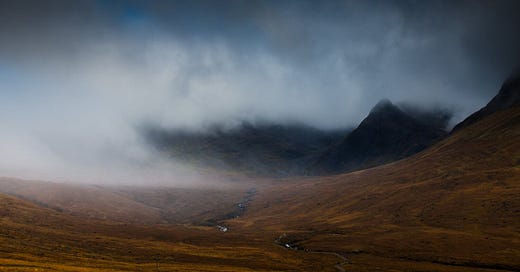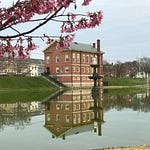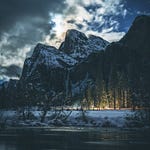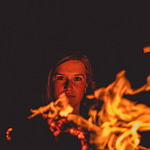Listen to The Saturday Stoke
Welcome to this week’s Saturday Stoke, a short inspirational podcast designed to encourage and challenge you on the path ahead—it’s a place where, if I’m doing my job right, I’m spurring us all on toward love and good deeds.
It’s a podcast that feels like your favorite old hat, and smells roasted marshmallows . If you're new to the Stoke, welcome! Feel free to poke around my blog The Edges Collective Dot Com.
If you find some inspiration, sign up for my newsletter called Further Up. You’ll get updates when the next episode of The Stoke drops and exclusive articles and community discussions. This week’s stoke looks at a topic that we all wish we had a bit more of: silence. Let’s get to it.
The world needs people who walk the path of enchantment. Who speak in songs. Who live in wonder, with eyes fixed on heaven. This is my thesis today. This is my hope for tomorrow. This is my encouragement and challenge for you, right here, right now.
“But Tim,” you say, “I really have no idea what you mean by walking the path of enchantment. That sounds so, well, you know, strange. And I’m beginning to wonder if you’re not one of those fuddy-duddy mystics who likes to walk the woods chanting.”
“Ah yes,” I reply. “I do realize that my propensity to use metaphorical language. ‘Speak in concrete terms,’ my Literature professor used to say.’ And so I hear your point, but do give me a few minutes to explain to you what I mean.”
I’ll begin my explanation by telling you a story.
One year, Allan Lightman, a former professor of science and the humanities at both MIT and Harvard, and his wife spent the summer at their country house chronicling the life and movements of a family of ospreys. One day, while standing on his back deck, he witnessed the baby ospreys’ maiden voyage.
Now strong enough to take flight, the two young ospreys plunged from their treetop straight toward Lightman, who stood frozen on his deck.
“My immediate impulse was to run for cover,” recounts Lightman, “but something held me to the ground.”
When the ospreys came within twenty feet of him, they shot up into the sky in a dazzling vertical climb. Lightman recalls the brief moment before the birds veered up.
“For about half a second we made eye contact. Words cannot convey what was exchanged between us in that instant. … After they were gone, I found myself shaking, and in tears. I do not understand what happened in that half second. But it was one of the most profound moments of my life.”
Lightman’s is a curious case. Despite his self-confessed atheism, he leaves room for the transcendent and the experiences in life that haunt with ambiguity, mystery, and beauty. He leaves room for unanswerable questions; for numinous moments. Years later, the unknown continues to intrigue Lightman.
For example, he divides his poetry collection Song of Two Worlds into two sections: Part I – Questions with Answers and Part II – Questions with Without Answers. He fills Part II with beautiful poems that tug on the reality of our lived experience in this world. In poem 58, for example, Lightman writes:
I surrender my calipers, rulers, and clocks,
Microscopes, diodes, transistors,
Glass flasks. For how can I measure
The stroke of passion? Or dissect a grief
With the digits of pi?
Thus, I stand naked, with nothing
Except a fierce hunger to fathom this world …
Lightman’s case is more prevalent than we realize. What it shows us is that an apologetic wormhole—so to speak—has emerged in recent years. This wormhole allows us speak into people’s real experience with beauty and mystery in this world, like the one I just shared with you. And what makes the emergence of this apologetic wormhole so exciting is because it comes to us through the concessions of academic atheists and quantum theorists.
Lightman admits that dismissing orthodox religion is not so simple and gives several reasons why. One of the reasons the sites is the witness of some of his colleagues. He works with accomplished men and women of science, working at world-class institutions, who firmly hold orthodox religious beliefs. Another reason is, again, that unanswerable questions exist. For example, Lightman admits to having trouble trying to explain he haunting feelings one has after reading a novel. He cannot explain why humans possess the irrepressible desire that an adult has to sacrifice their own life for their child’s. And finally, he cannot explain the ambiguous ethical dilemmas like stealing to feed one’s family.
Are you beginning to see how mystery and wonder and beauty provide a unique and powerful apologetic portal into our twenty-first century culture? Beauty possesses profound value because it prompts faith in the possibility of the unknown, the transcendent, the Divine; and faith allows a person to fully engage “with this strange and shimmering world” as Lightman describes it, and ask, “What if God does exist?”
Everyone wants to discover what lies behind the mysterious and glorious of this world. Don’t you? Take a moment and consider some of those moments you’ve experienced.
Things like the eerie wonder of first snowfall. The feeling of a jubilant “YAWP” after conquering a trail on my mountain bike. The breath-halting mystery of the birth of my children. The gentle kiss of my daughters. The joyful satisfaction gained from my work. Uncontrollable laughter. Autumn bonfires with friends and relatives. The quiet sobs of grief. The holiness of healing. The mountaintop scream of forgiveness.
The beauty and mystery and wonder I touch, feel, and perceive on a daily basis feels colossal, like how the sun floods the sky with its residue even when it has set. My experience of the world makes me feel like I am living in an unfurling corner of some great wonder.
Here’s a quick hack for using this apologetic wormhole: Create something.
“But Tim, I am not an artist or musician. Far from it.”
Yes, I understand that. And my response is: Don’t put such parameters on wonder and mystery and beauty.
Take a moment and think about your colossal moments of wonder, your own experiences with beauty and mystery. They extend far beyond the arts and humanities. Think of beauty as an event.
Now think about that dinner you made and the friends that gathered and conversations you had. Think how so filled with joy you felt after everyone left. That dinner was a creation of beauty. The conversation a thing of wonder.
We all of us can be creators. We need only to stop thinking of beauty in such a limited way.
Now think of Lightman’s colleagues. Leaders in their fields. Pursuers of excellence and truth. This was the strong witness Lightman could not shake. They witnessed to something else, beyond them. And that in and of itself is beautiful.
The world doesn’t always need a well-reasoned argument for faith or the existence of God. Sometimes, they simply need a friend who will stand and gaze upon the unknown with them, a friend who lives awash in the awe of the unknowable.
The world needs people who walk the path of enchantment. Who speak in songs. Who live in wonder, with eyes fixed on heaven. Do you see now why I chose this thesis? I chose it because the world needs people, like you.
Stay stoked my friends.















Share this post